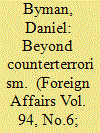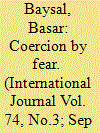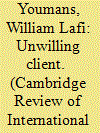| Srl | Item |
| 1 |
ID:
141545


|
|
|
|
|
| Summary/Abstract |
When the Obama administration looks at the Middle East [2], it does so through the lens of counterterrorism. A systematic emphasis on the subject has underscored not just the administration’s relentless pursuit of al Qaeda and its new focus on the self-proclaimed Islamic State [3] (or ISIS) but also a wider swath of its foreign policy, from its drone campaign in northwestern Pakistan to its maintenance of the detention facility in Guantánamo Bay.
|
|
|
|
|
|
|
|
|
|
|
|
|
|
|
|
| 2 |
ID:
169202


|
|
|
|
|
| Summary/Abstract |
The Iraq War was one of the most prominent events of the early 2000s. The prelude to the war halted the sense of optimism that captivated International Relations as a discipline after the end of the Cold War. The United States initiated this war following a lengthy securitization process. This study focuses on analyzing the securitization process in Iraq prior to the 2003 war. To that end, the article investigates the securitization process by asking, “How, within what context, and when did the securitization of Iraq take place?” For the study, 85 speeches made by President Bush are analyzed to examine how the president presented Iraq as an existential threat. The study also examines the kinds of arguments used by the Bush administration in securitizing Iraq. This study contributes to the literature on the 2003 Iraq War and security studies by applying Securitization Theory to the Iraq case by incorporating two essential contributions to the securitization analysis: context and audience(s).
|
|
|
|
|
|
|
|
|
|
|
|
|
|
|
|
| 3 |
ID:
173535


|
|
|
|
|
| Summary/Abstract |
Oil is a major concern for all countries of the world. The United States of America is also no exception to this. It is so because oil is sine qua non for human life and human mobility. It is in fact, the life blood of the world society. Since there is a very high importance of oil, all countries of the world crave for oil. Oil has been a double-edged sword for the Middle Eastern politics, simultaneously a source of power and of weakness, of economic development and of inequalities, and of social stabilization and of conflicts.
|
|
|
|
|
|
|
|
|
|
|
|
|
|
|
|
| 4 |
ID:
153874


|
|
|
|
|
| Summary/Abstract |
When the George W Bush administration announced the ‘freedom agenda’ in the Middle East, officials claimed it marked a major break in United States (US) foreign policy. In 2005, the administration intensified efforts pressuring Egypt, a client state, to democratize. However, the US continued pursuing security cooperation with and providing military aid to Egypt. Egyptian President Hosni Mubarak repelled US reform efforts by exploiting the normative inconsistency between democratization and security in the war on terror. This paper reviews Mubarak's ‘balking’ strategy (Stephen Walt, Taming American power, New York: WW Norton, 2005), including feigning compliance through nominal legal changes and counter-arguments to buy time until the inconsistencies in US policy came to a head. By 2006, the US had abandoned the freedom agenda and the Egyptian regime had embarked on a repression campaign. As I argue, the implications of the contradictions in US policy towards Egypt demonstrate that weaker client states may enjoy increased agency vis-à-vis a weakly committed patron hegemon.
|
|
|
|
|
|
|
|
|
|
|
|
|
|
|
|